- Home
- Lucius Shepard
Louisiana Breakdown Page 2
Louisiana Breakdown Read online
Page 2
Somewhere a chained-up dog is barking crazy.
The years spin and divide, flaking into days. The days run off like rain down a window.
It’s coming on twilight now.
2
June 22 – 6:66 P.M.
ANOTHER MUGGY EVENING, THE ASS-END OF ANOTHER worthless day. Standing on her cabin porch, Vida Dumars watched the Great Cloud of Being drift in off the Gulf to shadow the town. She recognized it by the Nine Forms, which were wisping up and dissolving in the frays at its edges. The one other time the Cloud had appeared, eleven years back when she was just eighteen, she had run away from Grail to be a wild child in New Orleans, to live with the witch man, Clifford Marsh, and so she took this new apparition for a sign that her life was about to undergo a change. That frightened Vida. Change was the last thing she wanted, especially if it led to the sort of abuse she’d suffered with Marsh. She would have liked to shut the cabin door and make believe the Cloud had gone away. But that would have been purely ignorant, and although Vida was distracted for sure and crazy maybe, she had left ignorance behind when she had run back to Grail. She studied the Cloud’s bumpy underside, hunting for a clue that might tell her something about the change to come. Grumbling overhead. Splotch of tin-colored light shining through the overcast in the west. But no real clues. After almost an hour, sluggish with dread and depression, she went inside to fix her supper.
The Cloud eventually moved off to the northeast, dragging in behind a sheet of darkness and stars. Vida struck out through the brush behind the cabin, keeping to a worn path that meandered among scrub palmetto, acacias, and stands of bamboo, heading for Thalia’s Pond and a swim. The pond was shaded by massive live oaks, crowded round by thickets, the banks edged by swamp cabbage and flowering weeds. Darkness welled from gaps between the trees. Stillness of cicadas and frogs, whispers of wind. A sheen of starlight polished the water. When she dove in, she had the notion she had slit a seam in some strangely permeable black mineral and that it had closed without a ripple over her, becoming black stone. It always surprised her that she could surface. When she shook her long chestnut hair, diamonds sprayed from the wet ends. The cool water tingled with the still-alive atoms of the demon that had been dissolved there a century ago by a Nanigo witch. Vida wondered if he could feel her, if he could know pleasure from her. Sometimes, the way the water gloved her, tighter and slicker than the Guff water, she was certain that he could. Sometimes just going with that thought gave her the pleasure of a man.
She swam under the newly risen moon, which looked like pieces of a busted silver mirror that someone had tacked up among the leaves. Her thoughts came in pictures, and she floated among them, conjuring up old friends. Once they had seemed embodiments of her need. Complex accessories to her joy. Now they had for her the simplicity of ancient statues, abandoned and isolate mysteries like cemetery figures wrapped in vines of circumstance, their marble streaked with burned-out veins of sick desire. But she still saw herself the way she had when she was young. Damaged some, and confused plenty, yet still clear and needful, an appetite with blood and breasts and tongue. She half-believed that time was running slow for her and fast for everybody else, hauling her along through the limbo it created in its wake, steeping her in the shade and not the bright center of life, and she didn’t know whether that was bad or good. Thinking like this heavied her, disturbed the engines of her equilibrium. She had to swim to keep afloat, stroking back and forth across the pond with the metronomic persistence of a wind-up toy. Toning the heart, the long, smooth muscles. She felt she was tunneling, catching a handful of the black water and throwing it behind, herself forward. Back and forth. Touching the bank and turning. Just getting up to speed before she had to turn again. Light splintering in her eyes.
When she was done swimming she stretched out on a flat rock at the south end of the pond to dry. The moon licked at her with its cool tongue, a weed nodded and tickled her thigh. She was tall and long-legged, a couple of inches under six feet, with a trim waist and flaring hips and pale freckly skin that made you think of the shells of farm eggs, the dusting heaviest across the slopes of her breasts. The kind of body guys would stare at slack-jawed from cars trembling at stoplights, and say to their buddies, lookit there, I’d like to get me some of that, and then shout some madness about pussy and drive away fast. Her features were strong—too strong, her detractors would say, to be called beautiful—and the irises of her dark brown eyes showed clean as targets against the whites. There was something daunting about the statuesque perfection of her body and the masklike stoicism of her features. It was as if she embodied an ideal of beauty, not beauty’s delicate particularity and warmth. Marsh had called her The Princess—it was not a term of endearment, but one calculated to distinguish her from the rest of his coterie, to give measure to the fact that when most anyone looked at her, they perceived her to be imperious and cold. That Vida sure is took with herself, they’d say, she sure is one stuck-up bitch. And yet they also had a sneaking suspicion that she was too good for them, that fate had marked her for special usage. They could love her and hate her in the same breath, and were so put off by the impression of strength and calm they received back from her, they only realized in retrospect that she was beautiful. But that impression was entirely misleading. Vida was far more beautiful than she was strong. She’d used up much of her strength in tearing herself away from Marsh. At the best of times she was skittish, prone to anxiety attacks, and each night she was tormented by dreams. She believed that through them Marsh was forcing her to live out the years as they might have been had she stayed in New Orleans to endure his usage. Her life had become a process of holding out against those dreams, and it was getting to be a harder struggle every day.
Once she was dry she gathered her clothes and set out for home, not bothering to dress, liking the feel of the warm air on her skin. Thalia’s Pond had a bad reputation. Nobody strayed there after dark…except the Guidry children, whose entire family ran around buck-naked themselves. She figured it wouldn’t be much cause for titillation if they had a peek. The swim had washed away her gloom, and the sizzling of crickets and cicadas gladdened her. As did the feathery gestures of the palmettos, the shadowy gateways of the bamboo. But as she reached a bend in the path, she began to have a sense that the moon, hobbling along to the rhythm of her footsteps above the tree line, was actually following her. She let out a laugh, trying to deny the feeling, but the shakiness of the laugh dismayed her. She picked up the pace. Palmettos bristled in a wind that kicked up of a sudden; the acacias leaned down toward her, and the blue-black starry sky lowered with the ponderous slowness of a collapsing circus tent. As if the night had suddenly changed its character, as if it had become angry at her intrusion into secret places. A queasy chill uncoiled in her belly. Felt like spiders traipsing up her backbone. She twitched her head from side to side. To the north, atop a low hill, a dead water oak with knobbly arms and forked-twig hands seemed to spring from nowhere and brand its witchy shape onto her brain. Marsh, she said to herself, it’s Marsh. But then she thought, no, it’s just wind, just nerves. She walked faster yet, pretending to ignore the slithers and whisperings. The bushes were talking about her, telling evil lies. Off to the left, a rustle. Something moving parallel to the path. She started to run, her breath shrieking. Clothes spilled from her arms. Bushes lashed her breasts, her arms; roots humped up to snag her ankles. Something, a bug maybe, buzzed past her ear, caught in her hair, and that panicked her worse than anything. She pictured a tiny winged devil burrowing through the damp tangles, getting ready to bore into her skull and breed. She tore at her scalp, raked her hair, wanting to snatch it out. She staggered off-balance and sprawled flat on her stomach right where the path widened into a sandy oval clearing picketed by bamboo.
She rolled over, a scream caged in her throat, certain that something monstrous would break from the thickets. Nothing, nothing, nothing. Moon-lacquered yellow stalks and sprig leaves hanging limp. The wind had died, the rust
ling had stopped. The clearing appeared to have closed in around her. Bamboo shadows slanted over hummocky sand and grass. The stillness frightened her as much as the tumult. If she moved a muscle, the wind and the rustling would come again. She lay propped on her elbows, knees partway drawn up, waiting for a sign that it would be all right to scramble to her feet and run, that the night had forgiven her. Then one of the bamboo shadows directly in front of her began to grow long. Inch by inch, it stretched out across the ground. She watched with the horrified fascination of someone mesmerized by a cobra rising from a basket. She refused to believe it at first. It was too much like her dreams. Yet there it was. Creeping inch by inch. A black pipe of shadow aimed straight between her legs. She saw the king stalk of bamboo, a glowing golden tube rising from the picket line, elongating and fattening. The brighter it shined, the blacker the shadow. She knew what was going to happen and her fear burned so fiercely, she thought she could manage to stand. But that was an illusion. Her strength fled, her will sheared away. She couldn’t turn her head or blink, only watch and tremble. Her mind was a stone and her thought a vein of hot color twisting through it. The bamboo shadow grew longer, its end vanishing in the shadow of her knees. Then it touched. Hesitated. The touch, the tension it brought, made her feel that her skull had been poured brimful of a fuming liquid and it was about to boil over. In reflex, her hips betrayed her and nudged forward. Fear was so intense now, so pure an anticipation, it was the same as pleasure. Then the shadow penetrated, going in slow at first. And then it plunged deep. Cold…God, it was cold. Heavy and hurtful like cold iron, working to get its whole length in, settling and holding for a second just like a man. Cold killed the sounds, palsied her limbs. Impaled, she fell backward, clawing up handfuls of sand. Her hips were lifted, and the cold spread through her, making her thrust and give. The shadow rammed in and out, churning her hips. Something was breaking inside her, and she thought, It’s killing me. She was almost grateful—it was too hard to live. But soon she realized that the breaking thing wasn’t death. Waves of breakage pushed up from her center, from a place no one had touched for so long…not since Marsh. And that was the crudest hurt, to know that he could have her yet, that she was still twisting on his pivot. She caught sight of the moon. Faceless, eyeless. But it saw her, it was part of this. And the trees, too. They were crying out, mimicking delight. She bit her lip hard to keep from joining their chorus. Each wave flung her high, then dragged her back below the horizon of consciousness, from dazzled light into blackness and burning. The sky completed its collapse, the stars were fireflies shining in her hair. Sand grains pricked her ass, grass blades stuck to her thighs. The world tipped sideways. She was cresting the last wave, pouring off the edge. She fought it, but the wave was too powerful. God. The black sun. The fall. Seizures of joy, spasms. The most you can hope for in Hell. Blood flowing out around a stalk of shadow. She was for a moment perfected, poised between things and the uncreate, held up to light and dark, an offering. And then she was gasping, abandoned, stranded in a place whose name and particulars she couldn’t remember. Trickles of sand sifted through her unclenching fingers.
She sat up after awhile.
Everything looked scattered, as if before there had been a unity. A patternless chaos of weeds and bird droppings and flattened beer cans. The bamboo had pulled back from the clearing. Shadows were not so sharp, and the moon was an empty power.
Damn fool, her. Going swimming in the devil’s flesh so close to St. John’s Eve.
Marsh, she thought, working up fresh hate for him, afraid that she wouldn’t be able to believe he had been to blame, that she would continue to blame herself. She said his name, said it again and again until it was like she was spitting out black seeds of him.
“Please,” she said. “Please…somebody help me.” And hated herself for that weakness. He was subtle, he never left her anything to hang onto, he wanted her to doubt herself. She felt like crying, but she refused to give in to the urge. She was cold. Not like before, but cold enough.
Finally she got to her feet and went back along the path, picking up her clothes. She pulled on her jeans and her plaid shirt, crumpled up her panties into a ball. She toe-and-heeled into her sneakers. Still cold. She cocked an ear, listening to the frogs, the cicadas. The slop of the Gulf water was audible now the wind had died. It seemed she knew something more than she had, that secret knowledge had come to her. But when she tried to fix on it, there was only the usual. Vida Dumars has a past, owns a diner and lives alone, a mystery to everyone she meets. That was the sum of her. The balled-up lump of years, with dirt impacting the folds. She needed secret knowledge, something to help her spin away from Marsh’s hold. Salvation maybe, a fit thrown down in front of a gawping congregation, a hole blasted through into her brain to let the balm of God flow in. No troubles anymore once you let Jesus take control. Something. Miss Sedele down at Le Bon Chance had her own ideas as to what that something should be, but though she done worse than lie down with another woman, Vida wasn’t ready to grasp at that particular straw.
The wind sprang up again, hissing in the palmetto fronds, stirring the bamboo, vibrating the shadows. It seemed to amplify the jittering of the stars. Strands of Vida’s hair, dry now, feathered across her face. Her cheeks were flushed, and the skin between her shoulder blades prickled. The branches of her being sprouted new sensitive buds, picking up sly movements here and there. She had a look behind her, to the side, and hurried toward the cabin.
What the hell had she been doing? Just standing around and feeling the breeze, acting like nothing had happened?
After a bit she slowed down, started watching where she was going. She didn’t want to be alone tonight; she needed people around her, even if they were only the freaks and losers who swung their partners over at Le Bon Chance. Marsh wouldn’t make her suffer anymore. Not just yet. She belonged to him and he enjoyed the fact of her belonging too much to push her off the edge. In his own way, he was temperate.
For this one night, at least, their affair was over.
3
June 22 – 9:11 P.M.
MUSTAINE WAITED FOR THE TOW TRUCK BENEATH the sign that presided over the outskirts of Grail. It was, he thought, a truly weird sign, smacking of a wry self-regard that seemed out of character for rural Louisiana. It was mounted on metal poles that elevated it above buzzing thickets at the side of the road, thirty feet or so from the shoulder where his red BMW was parked. A rectangle about the size of a double bed, lit by a sputtering fluorescent tube that flared as bright as a bar of burning magnesium. Swarms of moths fluttered around it, like shadows of leaves scattered by a wind nobody could feel. WELCOME TO GRAIL…LOUISIANA PURE AND SIMPLE was painted in script across the top, and occupying the remainder of the space was the line rendering of a chalice similar to those used to serve communion wine—Mustaine had supposed that a grail was intended. On second glance, though, he realized the lines might just as easily be seen to portray two identical human profiles staring at one another; depending on how you focused, you could see either the cup or the profiles, as with that old psychological test for evaluating perceptual bias.
Headlights coming from the direction of town. The tow truck, maybe. He wondered what kind of place Grail was. Odds were he’d have time to find out. It wasn’t likely they’d have parts for a BMW. A mosquito buzzed him, whined in his ear. He gave it a half-hearted slap. Sweat trickled down the back of his neck. The humid air clotted like glue in his throat. He considered the sign. What had it meant that he’d seen the chalice first? Maybe he’d failed the test. Can’t stay the night in Grail, son, ’less you see the two faces. He laughed. It probably meant he needed a couple of drinks. The headlights veered toward him, blinding, and he shielded his eyes, trying to see the car. Lights bracketed to a white roof. Police. He’d smoked the last of his dope back in Texas, but he was nervous nonetheless. A shadow climbed from the cop car, leaving the engine idling, and moseyed over. The beam from a flashlight speared into Mustaine’s eyes.
“Evening, officer,” he said. “I’m just waiting for a tow.”
The cop was young, maybe younger than Mustaine, but taller, wider, with a mean cracker face and a bad pimple beside his nose; he wore a sorrowful, dyspeptic look.
“Whyn’t you get up some ID,” he said.
Mustaine fished out his wallet. “You didn’t see a tow truck heading this way, didja? Man stopped earlier, said he’d send out a tow truck.”
The cop took Mustaine’s driver’s license, shined his flashlight on it; the webbed lines on his knuckles were etched deep with grime. “This ain’t you,” he said after a significant pause.
The photograph showed Mustaine with black hair down past his shoulders, his long face fuller, his blue eyes cored with glowing red dots from the flash. It was a photograph of manic excess, of a devout delusionary. Looking at it, he felt dislocated, off-balance, as if affected by a slight diminution of gravity—the way it goes when you gaze through the wrong end of a telescope at something close to hand.
“I got a haircut,” he said. “Lost some weight.”
“When you born?” The cop moved the license so Mustaine couldn’t peek.
“August 21, 1969. Deland, Florida.”
Mustaine rested his hand on the BMW’s hood and jerked it away. Still too hot to touch. Everything was hot. The air, the frying noises of crickets, the feeling in his head. Even the moon hanging over the Gulf, almost full, like a melted spotlight. Maybe this is justice, he thought, maybe justice feels this way. Like hot static and stuck somewhere in the middle of the dark with a big ugly fucker who’s got nothing better to do.

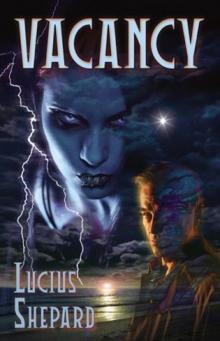 Vacancy & Ariel
Vacancy & Ariel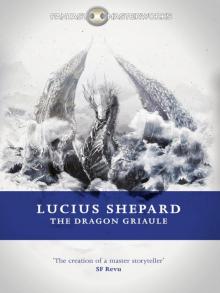 The Dragon Griaule
The Dragon Griaule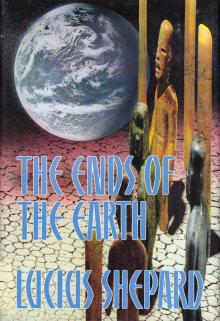 The Ends of the Earth
The Ends of the Earth Two Trains Running
Two Trains Running Life of Buddha
Life of Buddha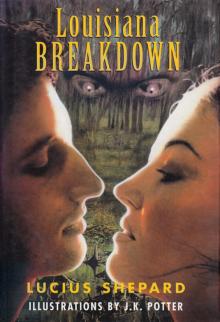 Louisiana Breakdown
Louisiana Breakdown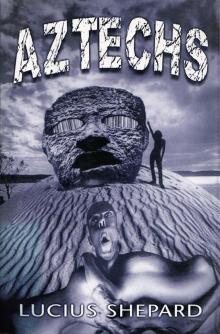 AZTECHS
AZTECHS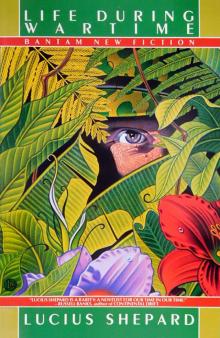 Life During Wartime
Life During Wartime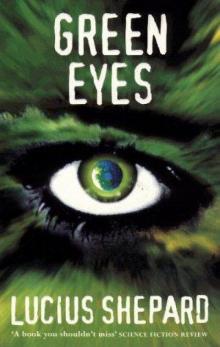 Green Eyes
Green Eyes Beautiful Blood
Beautiful Blood Stars Seen Through Stone
Stars Seen Through Stone Viator
Viator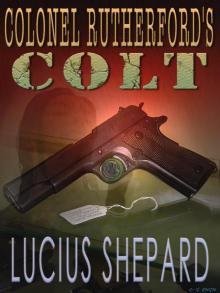 Colonel Rutherford's Colt
Colonel Rutherford's Colt Dagger Key and Other Stories
Dagger Key and Other Stories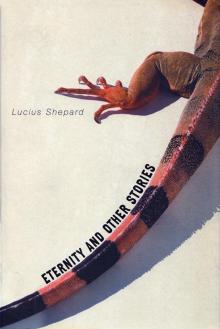 Eternity and Other Stories
Eternity and Other Stories Softspoken
Softspoken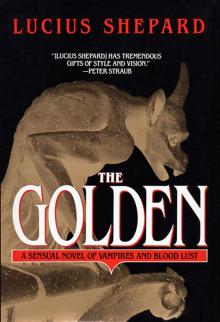 The Golden
The Golden